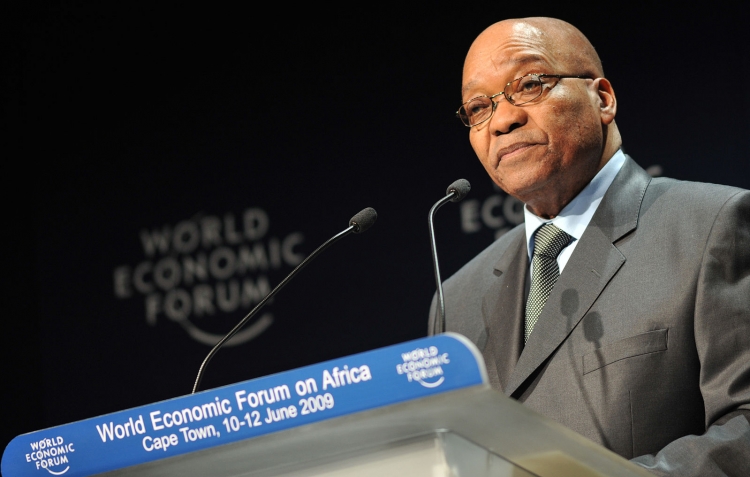Jacob Zuma: The Fall of South Africa's 'Teflon President'

On Wednesday 14 February 2018, South Africa's Jacob Zuma resigned as president of the republic after almost nine years in power. His resignation marks a transition from president embroiled in near-constant scandals that had lasted from the beginning to the end of his term.
Dr. Paul Kananura, the President of l'Institut Mandela, said, "it is, instead, social governance with massive investments in education, training, and employment which will cause the changes of behavior and mentality of the black people for a better life." He explained that the new ruling elite has forgotten the struggle of Apartheid - of which the ruling party African National Congress (ANC) was founded - and brutality of the white minority. This has led to the breakthrough of the Democratic Alliance (DA) and the emergence of the radical Economic Freedom Fighters (EFF) party, which is being led by Julius Malema, former president of the ANC Youth League.
South African politician Mosiuoa Lekota told News 24, "the blame for this situation must be squarely placed before the entire leadership of the ANC. They have protected him and they, themselves, have failed to uphold the Constitution." The ANC has been the ruling party since 1994, the year Apartheid officially ended. The party's and the country's first black president was Nelson Mandela, and in power after him was Thabo Mbeki, who ruled the country until Zuma's arrival.
"It is not the resignation of the President that will change the lives of black people," Dr. Paul Kananura said.
BBC said, "by the time of the memorial of South Africa's first black president, Nelson Mandela, in December of that year, ANC supporters were openly heckling and booing [Jacob Zuma] in front of foreign dignitaries - including US President Barack Obama." One of the protesters, the news agency recalled, said, "he is eating when we are hungry."
But it was no secret that Jacob Zuma was one of the most corrupt African presidents. According to BBC, "he has been a politician of nine lives, surviving a series of scandals which would have surely ended anyone else's career."
Even before his initiation as the President of South Africa, Zuma was facing charges of the rape of an HIV-positive family friend and money-laundering. The plaintiff's complaint was questioned after Zuma stated that he showered after the sexual intercourse, which would prevent him from contracting the deadly disease. In 2006, the court had a ruling and decided that the sex was consensual. The money-laundering charges were dropped a few weeks before the 2009 Presidential elections which placed Zuma in office, as they were assumed to be politically motivated. However, in 2016, the court found him guilty of using state money to renovate his private home - which includes an amphitheater, swimming pool, visitor center and a cattle enclosure. In 2016, Financial Times reported that the South African Supreme Court of Appeal had calculated 783 counts of corruption and fraud against the then-president.
Mosiuoa Lekota said, "The ANC has been comfortable."
After his involuntary resignation, Zuma told SABC, the national broadcaster, that he had not been given sufficient reasons for his resignation. In his opinion, "I'm being victimized here."
Cyril Ramaphosa, now interim President of South Africa, played a big role in the fight against Apartheid. He was the Chairman of the National Reception Committee that prepared for Nelson Mandela's release from prison. After three years as the MP and Chairman of the constitutional assembly, Ramaphosa left politics in 1997 to become a full-time businessman. Two decades later, he returned to ANC and was elected as the party's leader.
"I think African Presidents need to understand that there is life after the presidency," Dr. Kananura added. He brought to light the resignation of Ethiopia's Prime Minister Hailemariam Desalegn, a day after Zuma's, which occurred "without apparent pressure" and the recent resignation of Mauritian Prime Minister Anerood Jugnauth who left office to give way to young people. The President of the institute believes that these should be examples of a new public culture and responsibly in Africa. He added that "the gesture of resignation is a noble and elegant action that avoids conflict problems in the country."







